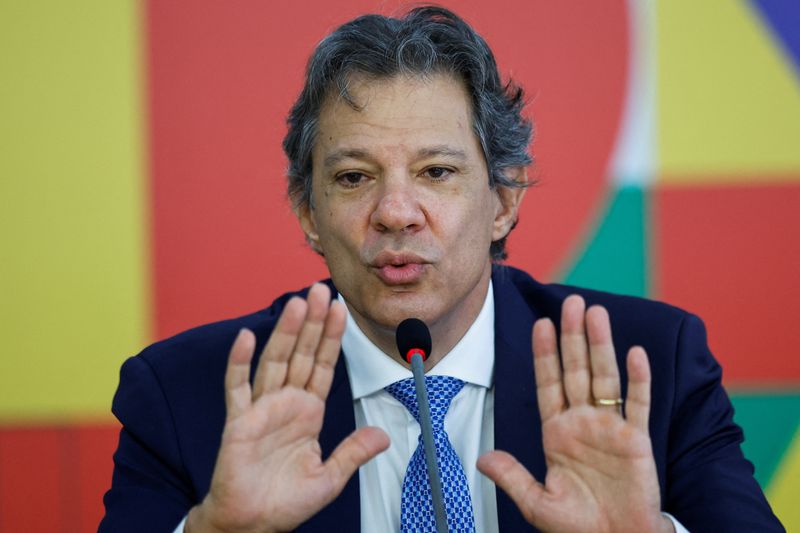By Marcela Ayres
BRASILIA (Reuters) – Brazil’s government on Thursday made detailed spending cuts aimed at achieving more than 70 billion reais ($11.8 billion) in savings over the next two years to support the new fiscal framework, but investors remained worried and concerned for unrest in the financial markets.
Investors were surprised by the announcement that tax exemptions would increase and worried that the government was basing itself on overly optimistic budget forecasts. The Brazilian real ended at its weakest closing level ever at 5.99 per dollar. Interest rate futures rose further and the stock index fell by about 2%.
Barclays (LON:) said long-awaited measures to curb spending had been overshadowed by plans for income tax reform aimed at easing the burden on the middle class. It said this credibility of the measures was limited and necessitated a stronger response from the central bank.
Uncertainty over the fiscal outlook had already led the central bank to call for structural measures to keep spending under control, accelerating the pace of tightening in November with a 50 basis point rate hike, bringing rates to 11.25% came.
“We now see that the central bank will raise rates by 100 basis points at its next meeting,” JP Morgan said, adding that it saw the government’s budget estimates as overly optimistic.
Finance Minister Fernando Haddad tried to calm the market after a crisis on Wednesday after announcing a proposal to raise the income tax exemption threshold for those earning up to 5,000 reais a month from 2,824 reais.
After weeks of delays, markets had expected the package to focus solely on spending cuts, in line with Haddad’s previous statements. These statements had suggested that the government would wait until next year to propose changes to tax exemptions in order to fulfill a campaign promise made by President Luiz Inacio Lula da Silva.
On Thursday, Haddad told a news conference that the broader income exemptions would have a budget impact of 35 billion reais, which would be fully offset by compensatory measures, which would only take effect in 2026 after approval by Congress.
COMPENSATIONS
The government said about half of the compensation would come from setting a higher effective tax rate for the wealthiest.
The proposal would increase the effective income tax rate for those earning more than 600,000 reais a year. The rate would reach 10% for individuals earning more than 1 million reais annually.
The current effective tax rate is 4.2% for the top 1% of income earners and 1.75% for the top 0.01%, government figures show.
To cushion the remaining budget hit, the government would, among other things, end the income tax exemption for pensioners who are seriously ill or have had an accident and earn more than 20,000 reais a month.
Media reports of an upcoming increase in income tax exemption had already soured market sentiment before the official announcement.
Haddad said the U.S. dollar has strengthened globally and inflation in Brazil is expected to end the year within or very close to the official target of 1.5% to 4.5%.

“The market needs to reread what the government is doing. They have been wrong in terms of growth and deficits (projections),” Haddad said. “Our work is not done yet. I don’t believe in silver bullets. I am happy with this year’s results.”
($1 = 5.9377 reais)


